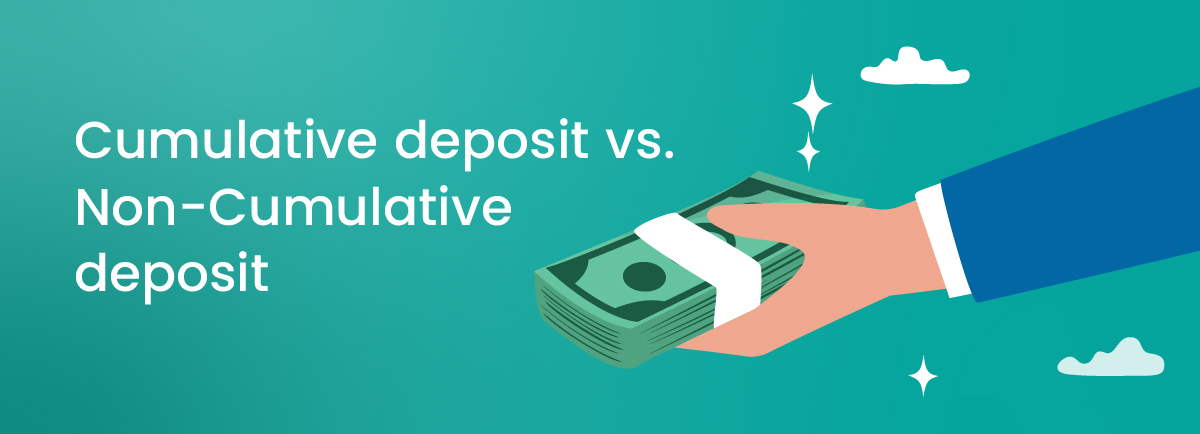
Difference Between Cumulative and Non-Cumulative Fixed Deposit
28 April 2024 | By INDIE
Fixed Deposits have long been seen as safe and dependable, providing assured returns without the uncertainty of the stock market. Despite the availability of various financial options, many Indians still rely heavily on FDs to save money. This trust in fixed deposits reflects a broader preference for traditional savings methods. However, not all FDs offer the same benefits.
Two primary types of FDs often confuse people - cumulative deposits and non-cumulative deposits. If you also want to dig deeper to understand what cumulative vs. non cumulative FDs mean, you have come to the right place. This blog post can help you understand these deposit types clearly so that you can make smarter choices about where to put your money beyond just sticking with what's familiar.
What are Cumulative FDs?
Cumulative FDs operate on a simple yet effective principle - the interest you earn on your deposit will be reinvested into the principal amount. It's like a snowball effect. As time passes, your savings grow from the initial and the interest it accrues.
Here's how it works: Suppose you deposit Rs. 1000 into a cumulative FD with an interest rate of 5% per annum. At the end of the year, instead of receiving the interest as cash, it's added to your initial deposit, making your total Rs. 1050. The following year, the interest will be calculated on this increased amount, resulting in even more interest. This compounding effect continues to snowball over the tenure of your deposit, gradually increasing your savings.
The benefits of cumulative fixed deposits can be summarised as follows:
● The reinvestment of interest leads to compounding growth, allowing your savings to snowball over time.
● If you compare cumulative and non cumulative FDs, the former often offer higher overall returns due to compounding.
● They are ideal for long-term financial goals, such as retirement or saving for your child's higher education, where steady growth is preferred/required.
● Cumulative fixed deposits are straightforward to understand, making them suitable for those who prefer a hassle-free approach.
Recommended Read: What is Cumulative FD?
What are Non-Cumulative FDs?
Non cumulative Fixed Deposits operate differently from cumulative FDs. Instead of reinvesting the interest earned, these FDs pay it out at regular intervals, providing a steady income stream.
These fixed deposits are ideal for individuals who require regular income from their savings or investments, such as retirees or those needing a secondary source of income.
Some of the key benefits of non-cumulative FDs are:
● They offer liquidity as you receive interest payments regularly, which can be useful for covering day-to-day expenses.
● You can choose the frequency of interest payouts, whether monthly, quarterly, semi-annually, or annually, based on your financial needs.
● You can diversify your income streams and reduce dependency on a single source of income by opting for non cumulative fixed deposits alongside other investments.
● They are suitable for short-term financial goals or for individuals who prefer to access their returns periodically rather than allowing them to accumulate over time.
● Non-cumulative FDs provide predictable returns, helping investors plan their finances with certainty.
Cumulative vs. Non Cumulative FD: Which One Should You Choose?
Choosing between cumulative and non-cumulative FD ultimately depends on your financial goals, preferences, and circumstances. Here's a quick comparison to help you decide:
You can choose cumulative FDs if:
● You have long-term financial goals and can afford to let your savings grow steadily over time.
● You prefer the simplicity of a single investment with compounding returns.
● You don't need regular income from your savings and are comfortable with reinvesting the interest earned.
You can choose non-cumulative FDs if:
● You require regular income from your investments to meet your living expenses or financial commitments.
● You prefer liquidity and the flexibility to access your interest earnings at fixed intervals.
● You have short-term financial goals or prefer to receive returns periodically.
With Fixed Deposits by INDIE, you can choose from cumulative and non cumulative fixed deposits. Invest today!




